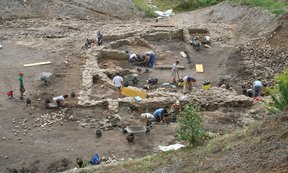The Roman city of Aguntum, with its alpine location and Mediterranean architecture transferred to the mountains, as well as its special economic basis on alpine resources, attracts numerous archaeologists who want to uncover the secrets of Aguntum. Under the direction of Martin Auer from the Institute of Archaeology at the University of Innsbruck, a Summer School will be offered for the first time next summer for all those interested. Aguntum is one of five cities in the province of Noricum that was granted city rights under Emperor Claudius in the 1st century AD. "What is particularly exciting is the Alpine small town scenario, and the excellent traffic situation with connections to the Alps as well as to the south or to the Hohe Tauern. The question of the history of the origins of the Roman municipium has also not yet been fully clarified," explains Auer, who emphasises that the students at the excavation site in East Tyrol benefit not only from rich find sites, but also from the excellent infrastructure on site. "In addition to a large practical component in the field, participants at the Summer School can expect a comprehensive introduction to the history of the Eastern Alps as well as excursions to the most exciting find sites in the region," says the archaeologist. Aguntum combined alpine structures with a strong connection to the south, which is particularly evident in the house forms and urban structures that were primarily common in the Mediterranean region. "In Aguntum, for example, there is a marketplace, a macellum, a meat market, which cannot be found in this form as a round building in the northern provinces," clarifies Auer. There are two different explanations for this, says the expert, "either the residents wanted to present themselves as Romans, or merchant families from the south brought their knowledge as well as technologies and building forms with them." In addition to the architectural peculiarities, the economic basis of Aguntum is also remarkable. The archaeologists were able to prove the trade in rock crystals on a large scale, which was previously unusual for a Roman city. "Such large quantities of rock crystal are found nowhere else. The archaeological findings indicate that the crystals, which came from the Tauern region, were sorted out and traded on in Aguntum. This is a unique industry for a Roman town," says Auer. The archaeologists are hoping for more detailed information on the course of the rock crystal trade from the currently ongoing continuation of the excavations in the merchants' forum.
Excavation experience in summer 2021
Aguntum has been the setting for excavations and teaching excavations at the University of Innsbruck for 30 years. Based on this extensive experience, Auer would like to pass on this knowledge to international students and those interested in archaeology within the framework of a summer school offered by the university's continuing education department. Over the course of four weeks, participants will receive a theoretical overview of the history of the Eastern Alps, with a focus on the Roman period, and learn documentation techniques such as drawings, 3D recordings, photography and photogrammetry. After these introductions, the participants will work on an area of the current excavation in Aguntum, in small groups. "The practical work on the excavation includes the uncovering, description and measurement of the archaeological features, recovery and initial treatment of the find material, as well as the further processing and interpretation of the finds and features. Accompanying courses are offered on the current discourse of field archaeological methods as well as on the broader historical framework of the excavation site in Roman and Late Antique times," clarifies Auer. At the end of the summer school, the participants will have become familiar with the entire excavation process and should then be able to independently carry out archaeological excavation work and document it according to the currently applicable standards.

